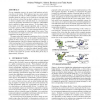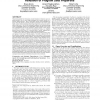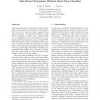754 search results - page 127 / 151 » Can self-managed systems be trusted |
SOSP
2003
ACM
14 years 5 months ago
2003
ACM
Peer-to-peer storage systems assume that their users consume resources in proportion to their contribution. Unfortunately, users are unlikely to do this without some enforcement m...
DATE
2010
IEEE
14 years 2 months ago
2010
IEEE
For any computing system to be secure, both hardware and software have to be trusted. If the hardware layer in a secure system is compromised, not only it would be possible to ext...
CODES
2005
IEEE
14 years 2 months ago
2005
IEEE
The growing number of information security breaches in electronic and computing systems calls for new design paradigms that consider security as a primary design objective. This i...
OSDI
1996
ACM
13 years 10 months ago
1996
ACM
This paper describes a mechanism by which an operating system kernel can determine with certainty that it is safe to execute a binary supplied by an untrusted source. The kernel r...
ICDE
2009
IEEE
14 years 10 months ago
2009
IEEE
Location cloaking has been proposed and well studied to protect user privacy. It blurs the accurate user location (i.e., a point with coordinates) and replaces it with a well-shape...



